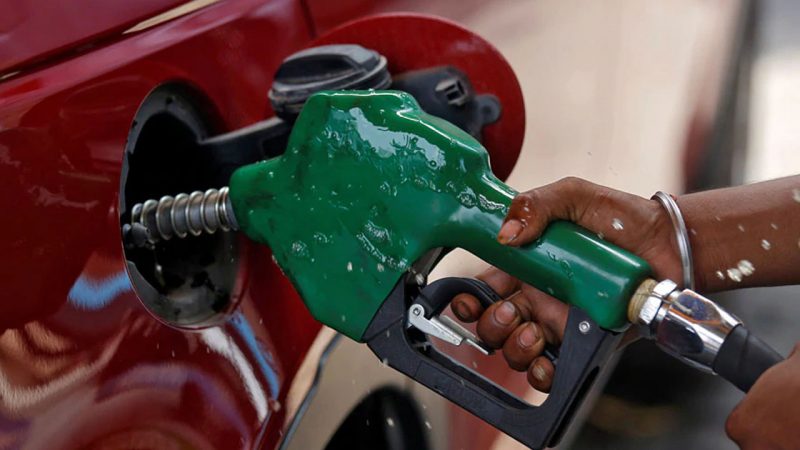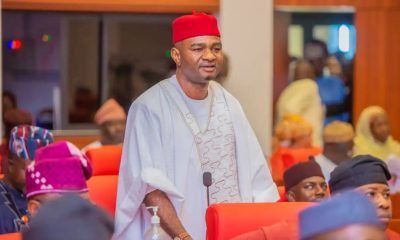Business
IMF: eNaira, other crypto better than bitcoin

The IMF says central bank digital currencies (CBDCs) such as eNaira are a better bet than cryptocurrencies including bitcoins and other altcoins.
The IMF Managing Director, Kristalina Georgieva, stated this, adding that the CBDCs were gaining momentum after moving from theoretical to practical explorations.
Georgieva stated, “In order to become familiar with the bits and bytes of digital money, central banks are getting to work.
“We don’t yet know how far and how fast CBDCs will go, since they are still in their infancy. As a result, central banks are building up their ability to harness new technologies – so that they will be ready for whatever lies ahead.”
There are about 100 or so countries that are exploring CBDCs with support from the IMF.
“In contrast to private digital currencies, CBDCs can potentially offer greater resilience, more safety, greater availability, and lower costs when designed prudently.
“Crypto assets, which are inherently volatile, are not backed by any government. It is possible that even the best-managed and regulated stablecoins cannot compete with a well-designed and stable central bank digital currency,” she said.
According to her, global central banks are committed to minimizing the detrimental effects of CBDCs on financial intermediation and credit provision. In order for the economy to function properly, this is imperative. The CBDCs we studied are not interest-bearing, which makes them useful, but not as attractive as traditional bank deposits as a vehicle for savings.
Several CBDC projects were examined in-depth in a recent IMF paper.
The IMF had previously raised concerns about crypto assets threatening financial stability and consumer protection and eating into banking sector market share.
Business
Petrol price rises to N935 in Lagos

Petrol price rises to N935 in Lagos
Petrol marketers across the Lagos metropolis at the weekend raised the pump price of the commodity to between N925 per litre and N935 per litre.
This is in response to the increase in the landing cost of petrol, the stoppage by Dangote Refinery of the sales of the commodity in naira about two weeks ago and the delay in conclusion of negotiation on the naira for crude policy.
Last Monday, the landing cost of the commodity rose to N843.28 per litre from a previous N797 per litre a forthnight ago.
This increase represents an addition of N46 per litre to the landing cost of petrol.
Some filling stations like TotalEnergies sold at N935 per litre; MRS, N925.
ARA is a crucial global oil and biofuel hub known for its physical infrastructure, pricing benchmarks, and significant oil consumption.
It added that seasonal refinery maintenance across Europe and a recent fire at the Falconara refinery in Italy have further restricted supply, adding to market tightness and price volatility.
The Association said the foreign exchange rate remained fairly stable, with minimal fluctuations observed over recent periods.
Therefore, the landing cost of petrol, being fundamentally influenced by these elements, is likely to change several times intra-day.
It advised that savings can be achieved through negotiations, access to foreign exchange, and logistics efficiencies, for example, by eliminating Ship to ship (STS) transfer where possible or receiving larger cargos.
MEMAN explained that the landing cost into Apapa/ASPM Jetty is calculated based on the following assumptions: exchange rate, finance charges at 32 per cent per annum for 30 days; STS and related charges; NIMASA charges at two per cent of local STS; NMDPRA at 0.5 per cent MDGIF; NPA and VAT charges covering towage, berthage/mooring, ship dues, cargo dues, contingency, fire coverage, agency fee; other costs at N2 per litre.
Petrol price rises to N935 in Lagos
Business
Dangote Refinery: MRS, other filling stations increase petrol price
Dangote Refinery: MRS, other filling stations increase petrol price
The price of petrol has surged to N930 per litre in Lagos and N960 in northern states, following the recent suspension of naira payments for crude oil by the Dangote refinery.
MRS filling stations implemented the new pricing structure on March 28, 2025, marking a N70 increase from the previous rate of N860 in Lagos and N80 higher than the former N880 in the North.
Other fuel retailers have also adjusted their prices, with NIPCO reportedly selling at N930 per litre in Magboro, Ogun State, on Saturday.
According to MRS Oil & Gas, trucks will load products from its Lagos depot and distribute them across the country at varying costs.
The company’s latest pricing document confirms that Lagos has the lowest fuel rate, while northern states face the highest prices. However, the company did not specify whether it sourced its supply from the Dangote refinery.
Under the revised price framework, petrol now costs N930 per litre in Lagos, N940 in other South-West states, and N960 in the South-South and South-East regions, including Edo, Abia, Akwa Ibom, Bayelsa, Rivers, Cross River, and Enugu.
READ ALSO:
- Ex-Rivers HoS wife cries for help over husband’s safety
- Fubara reacts as Ex-HOS, Nwaeke accuses him of bombing oil pipelines, Rivers Assembly
- Natasha: Emmanuel Uduaghan threatens to sue Senator Nwaebonyi
In the North, Abuja, Kaduna, Benue, Kogi, Niger, Sokoto, Kebbi, and Nasarawa will pay N950 per litre, while Zamfara, Kano, Jos, Bauchi, Taraba, Adamawa, Borno, Katsina, Jigawa, Gombe, and Yobe will pay N960.
The Free Carrier Agreement (FCA) price, which determines how much marketers pay before reselling fuel, also differs by region. Lagos has the lowest FCA price at N905 per litre, whereas states like Borno, Taraba, Adamawa, and Yobe have FCA prices around N888 per litre.
The recent suspension of the naira-for-crude initiative by the Dangote refinery was attributed to discrepancies in crude oil allocation. Sources indicate that the Nigerian National Petroleum Company Limited (NNPCL) allocated large volumes of crude to foreign creditors to settle outstanding loans, making it difficult to sustain local transactions in naira.
As a result, independent fuel importers have taken advantage of the situation, increasing depot prices. Industry analysts warn that the rising petrol costs could drive up transportation fares and the prices of goods and services.
Experts suggest that prices may stabilize once the Dangote refinery secures a reliable crude oil supply from NNPCL and resumes selling in naira. Until then, consumers across the country will have to contend with higher fuel costs.
Dangote Refinery: MRS, other filling stations increase petrol price
(PUNCH)
Auto
Lanre Shittu Motors to endow Automobile Department of Lagos Technical College

Lanre Shittu Motors to endow Automobile Department of Lagos Technical College
Lanre Shittu Motors has announced a novel idea that will boost automobile studies in a Lagos technical college.
Specifically, it has pledged to adopt the Automobiles Department of the Government Technical College, Aso-Soba in the Festac area of Lagos.
This is intended to raise academic and practical programme standards of the school.
The company said this would involve adequate funding, in-school training and intensive industrial training (IT) with welfare package to encourage more young people to pursue academic career in automotive engineering.
Business Support/Admin Manager of LSM, Mr Babatunde Adenuga, disclosed this in Lagos, in an interview with journalists.
Adenuga represented the LSM Managing Director, Mr Taiwo Shittu, at the just concluded Engineering Week of the college sponsored by the auto company, where he unveiled the plan to the staff and students at the event’s grand finale.
Aside from the needed financial support to make the auto department functional and standard, he said LSM would provide the tools, overall wears/workshop uniform, among others, as part of the welfare package for the students.
He said it would be a win-win situation for the school and the company.
Adenuga said, “The school will benefit immensely from the LSM package for the department as we take the financial trouble of running the department away from them.
“Students from the department can come for their internship at LSM workshops, and getting jobs after school won’t be difficult.
“For us, it will be a seamless arrangement in getting suitable personnel familiar with our training and business orientation.”
He also said the LSM had been absorbing students from the school and others for their industrial training (IT), providing them with useful hands-on training and monthly stipend to keep them going.
The LSM MD, Taiwo Shittu, commenting on the support, said, “We’ll be part of the progress of the school. We want to own a department in the technical college, the automobile department of studies that will enable us to fund the place; take care of the welfare of students, providing the tools, overall uniform and other facilities.”
“At LSM, we see training the youths as part of our Corporate Social Responsibility. Every year, we take in youths into our facility and train them; even while in training, we give them stipends.”
The highpoint of the LSM-sponsored Government Technical College event was the presentation of prizes to outstanding students in the various competitions held for the Engineering Week.
Three of the students whose projects stood out such as locally produced water pumping machine and water heater went home with impressive cash awards.
Principal of the college, Mr Folarin Sunkanmi, expressed appreciation to LSM for the interest in the school, starting with giving the students the opportunity for industrial training and offering them monthly stipend.
The principal commended the LSM efforts of sponsoring the engineering week’s activities, whose theme was given as ‘Engineering for Sustainable Development (Innovators of tomorrow)’
He urged other companies to emulate the LSM example in order to boost the employability chances of products of the technical colleges and engineering departments of higher institutions in the country.
-

 Uncategorized2 days ago
Uncategorized2 days agoBreaking: Moon sighted in Saudi, UAE, others, Eid-Fitr holds Sunday
-

 metro2 days ago
metro2 days agoRamadan ends in Nigeria, Sultan announces March 30 as Eid-el-Fitr
-

 metro3 days ago
metro3 days agoFubara reacts as Ex-HOS, Nwaeke accuses him of bombing oil pipelines, Rivers Assembly
-

 metro2 days ago
metro2 days agoEmbrace environmental sanitation during Eid-Fitr, LAGESC boss tells Lagosians
-

 Opinion3 days ago
Opinion3 days agoBarbaric mass burning of innocents in Edo, by Farooq Kperogi
-

 metro3 days ago
metro3 days agoEx-Rivers HoS wife cries for help over husband’s safety
-

 International14 hours ago
International14 hours agoIn pictures: Eid celebrations around the world
-

 metro3 days ago
metro3 days agoNatasha: Emmanuel Uduaghan threatens to sue Senator Nwaebonyi







